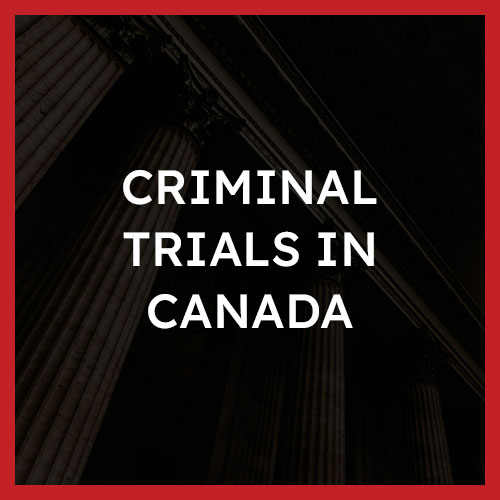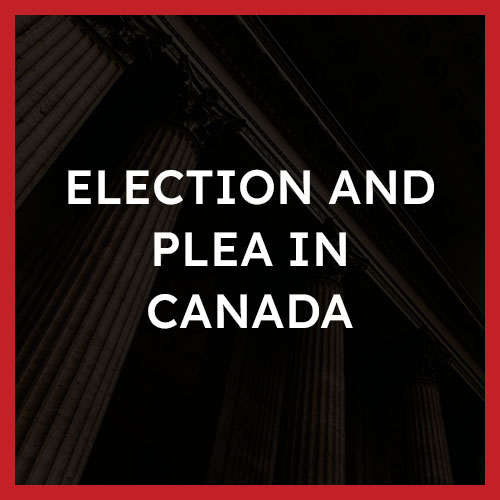How does a criminal trial work in Canada?
Criminal Process Steps in Canada
When facing a criminal charge, it is crucial to consult a lawyer as early as possible. An experienced criminal defence lawyer can help you at all stages of the process, from maximizing your chances of being released on bail to appealing your verdict. Even before charges are formally laid, if you have reason to believe you may soon face criminal charges, you can seek pre-charge legal advice.
For more information on pre-charge legal advice, please select the location nearest you and select “Pre-Charge Legal Advice” from the “Court Process” drop-down menu.
The criminal process in Canada can be broken down into four stages:

Stage 1: Arrest, release, and your first appearance
In Canada, the criminal trial process begins with your arrest. Once arrested you can be released with an appearance notice, an undertaking, or a release order. Depending on the circumstances and the severity of your charges, you may be held in custody until you are brought before a judge for trial. Whether you are released by the police or are required to appear before a judge for a formal bail hearing will depend on the seriousness of the charge and your specific circumstances. After your arrest, a date for your first appearance will be set, typically in a docket court.
The purpose of your first appearance is to provide you the opportunity to tell the court how you intend to proceed with your charges. Specifically, you can tell the court if you intend to plead guilty or not guilty and therefore would like to set your matter for trial. Alternatively, you can adjourn the matter on first appearance if you do not have disclosure (the information the police and Crown have on your case) and/or a lawyer. If you adjourn (whether by yourself or with the help of a lawyer), your matter will typically be rescheduled for a new date (typically no more than 2-4 weeks later) so that your disclosure can be reviewed prior to entering your guilty or not guilty plea.
If you plead guilty, your matter should be set for disposition so that you have an opportunity to make proper sentencing submissions to the court. The purpose of sentencing submissions is to provide information to the court about your personal background, your character, and the circumstances of the offence to mitigate the moral culpability of your actions. For example, you might explain to the court that you stole because you had no money for food, that this is your first criminal offence, and that you have since taken actions to remedy the wrong that you committed. This information will help the court assess a proper and proportionate punishment.
Stage 2: Pretrial preparation and pretrial motions
If you plead not guilty and set your matter for trial, you will need to meet with your lawyer and begin preparations to argue your case in front of a judge and or jury. Prior to trial your lawyer will meet with you and go over disclosure, explain the overall trial strategy, and prepare you for questioning if you will be taking the stand.
Depending on the nature of your charges, certain pre-trial issues will need to be addressed. Some of the most common pretrial issues are related to non-disclosure. That is, sometimes the Crown fails to disclose all the evidence that is relevant to your trial and is necessary for you to make a full answer and defence. In such an event, your lawyer will argue that the trial should not proceed, and the Crown will likely request an adjournment. At this juncture, your matter will either be stayed, or the adjournment will be granted, and your trial date will be set back so that the Crown can provide you with the missing materials.
Prior to your trial date, you may also be scheduled for a pretrial conference. A pretrial conference is a meeting between the Crown, your lawyer, and a judge that takes place after your lawyer has examined all the evidence and has considered various aspects of your defence. During the meeting, different aspects of the case may be discussed, including how many witnesses will be in attendance, whether all disclosure has been received, whether a Charter motion will be filed, and whether the matter is expected to resolve prior to trial.
Depending on the seriousness and complexity of your charges, you could also require a preliminary inquiry. The primary purpose of a preliminary inquiry is to determine whether there is enough evidence to justify a trial, or to address evidentiary issues like what witnesses will be testifying, whether they should be testifying, and what they are expected to say. To address these issues in the preliminary inquiry, the Crown will call witnesses who will testify to issues that have been specified and agreed upon by the parties. At the end of the hearing, the matter will either be sent to trial or, if there is insufficient evidence to continue prosecuting, the accused will be acquitted.
If you have been charged with an indictable offence, prior to trial you will also be given the opportunity to make an election, if applicable. That is, you will be able to elect whether you will be tried before a judge and jury, or a judge alone.
Step 3: Trial
Once all pretrial issues are addressed, your trial should proceed on it’s set date. The length of your trial depends heavily on the nature and complexity of the charge, the type of issues that are raised, the number of witnesses called, and whether it is being heard before a jury or a judge alone. Most low complexity summary conviction offences typically take between one to two days, while complicated indictable offences can take anywhere from several days to a month or more. In Canada, trials are open to the public, and a trial transcript will be generated which will become part of the public record.
On the day of trial, the Crown prosecutor will call their witnesses first, and you will then have an opportunity to call any witnesses you have or testify yourself. If a Charter motion has been made on your behalf (that is, an application alleging that your Charter rights have been violated) all relevant witnesses will be called in a voir dire. A voir dire can be thought of as a trial within a trial where arguments based on specific sections of the Charter are heard. The purpose of a voir dire at this stage is to argue that evidence was gathered in violation of your rights and therefore, it should not be admissible at trial. If the defence is successful, some or all of the incriminating evidence against you can be excluded. If enough evidence is excluded, the Crown may be required to have the charges withdrawn or stayed, as they no longer have enough evidence to prosecute you.
If there was a voir dire, the judge will decide on the Charter issues raised, and the trial will either end or continue depending on what evidence was properly admitted into the trial. If the trial continues after the voir dire, the Crown will go first and will call any additional witnesses or evidence they might have. Once they have finished, the defence will have an opportunity to call witnesses or address issues that they did not raise in the voir dire. After all witness testimony is heard, the defence will make their closing argument, followed by the Crown’s closing argument.
Step 4: Verdict and sentencing
Once both parties have made their submissions, the judge will render a decision, or the jury will deliberate. If you are acquitted, you will be free to leave. If you are convicted, both the Crown and your lawyer will make submissions regarding what sort of sentence would be appropriate in the circumstances of your case. In some situations, a judge may ask that both Crown and defence provide written submissions so that the judge has time to consider the arguments raised, before making their decision. In these instances, the judge will request written arguments be submitted by a certain date and will also specify when they expect to provide their decision.
Following the decision, sentencing may be adjourned and held on a different day so that your defence counsel can prepare fuller submissions for sentencing. For more information on sentencing, please select the location nearest you and select “Sentence” from the “Court Process” drop-down menu.
What’s Next?
Facing criminal charges can be a scary and confusing time. If you need pre-charge legal advice, or are facing charges without representation, please contact us today for a free consultation with one of our experienced and dedicated criminal defence lawyers. We are here to help you navigate the criminal justice system and thoroughly explore all possible defences available to you.
About The Author
Ask A Question
We endeavor to respond to questions within 24 hours. If your matter is urgent, please call our office or submit a request for a free consultation.







